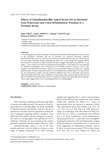Effects of Limosilactobacillus reuteri Strain 164 on Intestinal Gene Expression and Colon Inflammation: Potential as a Probiotic Strain
JARQ : Japan Agricultural Research Quarterly
| ISSN | 00213551 |
|---|---|
| 書誌レコードID(総合目録DB) | AA0068709X |

本文フルテキスト
jarq59-2_155-162.pdf908.72 KB
As weaning piglets are easily susceptible to infections and diarrhea, addressing these issues is critical in pig production. Therefore, the use of probiotics has garnered increasing attention. Limosilactobacillus reuteri (L. reuteri) is one of the most studied probiotics that can colonize the gut of a wide range of animals. Studies examining the effects of L. reuteri in pigs have suggested that it can be used as a probiotic to reduce intestinal diseases in piglets and improve productivity. In our study, L. reuteri strain 164 (L164) was isolated from farm pig feces. The isolated L164 was evaluated for antibiotic susceptibility, and we found that L164 had little antibiotic resistance. L164 is also resistant to low pH and bile treatment, similar to Lacticaseibacillus rhamnosus strain GG, a notable probiotic strain. The gene expression analysis of L164-ingested mice indicated that L164 may activate the aryl hydrocarbon receptor, decrease intestinal epithelial stem cells in the ileum, and increase enterochromaffin cells in the colon. Furthermore, experiments using a mouse model of colitis showed that L164 inhibited colon shortening caused by a chemical colitogen and reduced diarrheal symptoms. These results suggest that L164 is a promising probiotic for weaning piglets.
| 刊行年月日 | |
|---|---|
| 作成者 | Reiji AOKI Naoko MORIYA Tadashi TAKINO Hiromi KIMOTO-NIRA |
| 著者キーワード | antibiotics weaning piglets |
| 公開者 | Japan International Research Center for Agricultural Sciences |
| 受付日 | 2024-05-21 |
| 受理日 | 2024-08-30 |
| オンライン掲載日 | |
| 巻 | 59 |
| 号 | 2 |
| 開始ページ | 155 |
| 終了ページ | 162 |
| DOI | 10.6090/jarq.24J06 |
| 言語 | eng |
